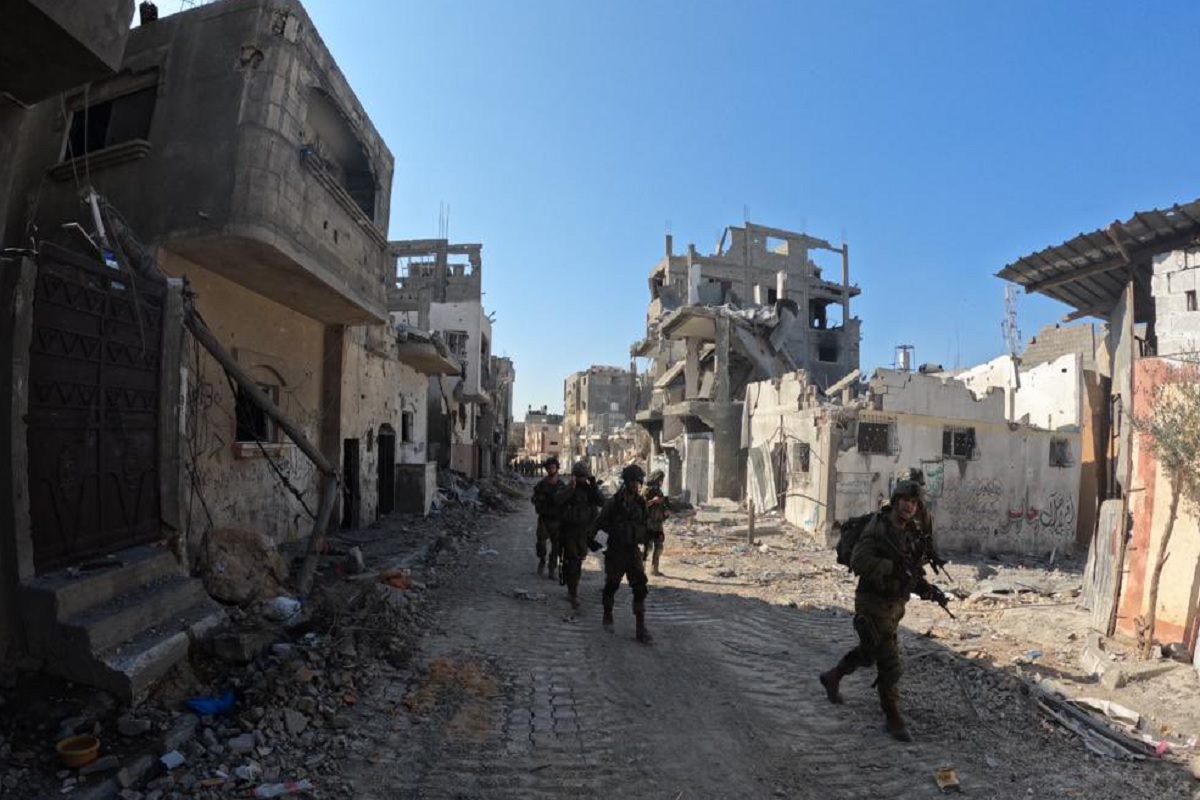When the horrific savagery, red in tooth and claw, was let loose on innocent people in Israel and Gaza, and anti-Semitism and anti-Muslim hatred were spreading in America and Europe, an anguished Jewish woman cried in pain, “Where is God in this time? Where is he or she?”
The whole world watched in shock and utter helplessness as bereaved Israelis prayed and hoped that their loved ones taken as hostages would be alive in Hamas’s tunnels and hideouts in Gaza. On 7 October, Hamas, the Islamist militant organization, went on a murderous spree turning peaceful Israeli kibbutzim into a killing field; and kidnapped hundreds of Israelis including the elderly and women; and children as young as a four-year-old Avigail Idan, an American-Israeli girl whose parents were killed in the Hamas attack.
Advertisement
The terrorist attack was followed by a most brutal Israeli bombardment and ground war in Gaza that killed thousands of Palestinians in homes, in hospitals and in streets, and a forced mass exodus toward southern Gaza with no exit to the sealed Egyptian border. With rows of premature neonatal kids struggling for breath, hundreds and hundreds of Palestinians buried under the rubbles of the bombed buildings, mothers looking for their children, it seemed that there would be no end to this insanity. International pleas for ceasefire, for relief supplies, food, medicine, and fuel to reach the starving, struggling, besieged Gazan Palestinians went unheeded fearing that a temporary pause might turn into a stalemate advantage for Hamas with no hope of getting the hostages back; or Hamas’s elimination as Israel Prime Minister Benjamin Netanyahu had vowed.
In an interview with CBS’s Stephen Colbert, legendary singer and actress Barbara Streisand made a poignant and impassioned plea for compassion. “It’s sad about what’s going on today – meaning people have to live together, even though they’re different religions or whatever. People are people. It’s true. We all want the same thing. We all want love in our hearts. We all want family. We all want to feel secure… this is heartbreaking what’s happening now with these people, the children, the mothers ~ doesn’t matter what religion they are. This is beyond religion.
This is insanity for us not to learn how to live together in peace.” In a moment of profound vulnerability, Streisand questioned the role of faith in times of such darkness and despair. She wondered where God was in the midst of these tragedies, seeking solace in the belief that a higher power could guide humanity towards a path of understanding and compassion. Streisand’s remarks were ignited by the horrendous events that seemed unstoppable. The atrocities, rooted in religious extremism and intolerance ~ death to Israel ~ have shaken the very foundations of peace in the Middle East and elsewhere, leaving many of us grappling with questions of faith and the very essence of humanity. Nonetheless, after 46 days of brutal conflict the two sides agreed to a four-day truce for the release of 50 hostages ~ from among the 240 hostages, Israelis and foreigners from 40 countries ~ in exchange for 150 Palestinians held in Israeli prisons.
Apart from the release of hostages and prisoners, the truce included truckloads of food aid and fuel to be sent to Gaza where 2.3 million people have been starving, and many hospitals have been shut down because of the lack of power and medical supplies. The oil-rich Gulf state Qatar, along with the United States and Egypt, played a major role in brokering the truce. This has raised some hope that the humanitarian pause might be extended and has further raised the possibility of negotiations for a long-term solution.
The IsraeliPalestinian conflict has been a source of immense human suffering and political instability for decades. Numerous attempts to resolve the conflict have failed, leaving many wondering if a peaceful solution is at all attainable. However, amidst the despair, there exists a viable path forward: the two-state solution. Former Israeli Prime Minister Ehud Barak told TIME that Israelis “have a compelling imperative to disengage from the Palestinians to protect our own security, our own future, our own identity.”
The two-state solution envisions an independent, sovereign Palestinian state alongside Israel, with both states coexisting peacefully within secure and recognized borders. It would provide a just and equitable framework for resolving the conflict, and address the core aspirations of both Israelis and Palestinians. It would promote stability and security in the region, eliminating the constant threat of violence and instability.
In the long run, the twostate solution would foster economic prosperity, enabling both Israel and Palestine to reach their full potential. Furthermore, it would promote cultural and religious freedom, allowing both communities to thrive and preserve their unique identities. The alternative, a one-state solution, with the West Bank under Israeli occupation and expanding Jewish settlements, and Gaza under the control of Hamas supported by Iran, would lead to continued conflict and instability.
To achieve a two-state solution, both parties would have to make significant compromises and demonstrate a genuine commitment to peace. Israel must acknowledge the legitimate aspirations of the Palestinian people and agree to make territorial concessions. Palestinians, in turn, must recognize Israel’s absolute right to exist and unconditionally renounce violence. The United States, Arab nations, the European Union, India and China have a vital role to play in facilitating and supporting the two-state solution.
Providing diplomatic and financial assistance would help build trust and confidence between the parties, while also addressing the economic and social needs of both communities. The two-state solution is the only path to peace. Leaders from both sides must seize this opportunity to break the cycle of violence and embark on a journey towards mutual security and reconciliation. With peace in the Middle East, anti-Semitism and Islamophobia would dissipate in the course of time.
(The writer is affiliated with the Graduate College at Norwich University, USA. Under the auspices of Osher Institute at Dartmouth College, Dr.Batra gave a public lecture, Our Freedoms and the Age of Artificial Intelligence, which is now available at Dartmouth YouTube channel: https://www.youtube.com/ watch?v=3Y2vvSqn3w8)











